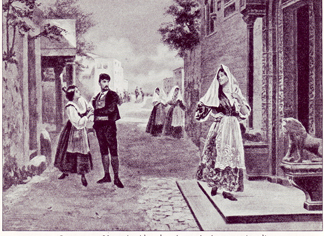Share |
Music: When Composers Are Victims of Their Own Success
By Frank Behrens
ART TIMES March/ April 2011
 Scene from Cavalleria Rustican Scene from Cavalleria Rustican |
There comes a time in some composers’ lives that they create a piece that is tremendously popular (a Good Thing, surely) but that causes them considerable grief afterwards.
I have already in past articles mentioned how Cole Porter’s “Kiss Me Kate” was so well received that critics said of his next show, “Can-can,” that is was not up to Porter’s standards. Did he, by any means, regret having written “Kiss Me Kate”? Of course not.
Take the case of two men who became “one-opera” composers. Pietro Mascagni wrote his “Cavalleria Rusticana” between 1888 and 1890 for a contest. There is a story that he was so unsure of the work that his wife mailed it in without telling him. And that is the one of his 17 or so operas that has stayed in the repertory. Yes, occasionally his “L’Amico Fritz” is performed for the sake of its only popular number, “The Cherry Duet,” and “Amica” has been recorded on a DVD as a curio.
The same can be said of Ruggiero Leoncavallo’s “I Pagliacci” (1892), which has overshadowed all his other works. Perhaps his “La Boheme” would still be regularly performed had not Puccini’s version made it impossible.
Did either composer regret having made one big hit and no other? Certainly they regretted the latter, just as certainly not the former.
But the history of music abounds in works that were regretted by the composer, often for the most ironic of reasons.
Daniel Emmett helped originate the Minstrel Show, something of an embarrassment for the more sensitive folk today. As a lad, he had a talent for writing new lyrics to old tunes, one of his earliest successes being “Old Dan Tucker.” In 1830 or 1831, the minstrel troupe of which he was a part needed a song for the final segment, the Walk-around, and Emmett was asked to dash one off overnight. He did and the song was so popular that other minstrel troupes asked for permission to use it. It was granted but the composer/lyricist lost the copyright by doing so.
Years went by and the tune was turned into a quickstep, thereby increasing still more its exposure and popularity. But then the Civil War came and the Confederate Army (or Rebels, depending on one’s inclinations) took it up as a stirring Southern quasi-national anthem, often sung to altered lyrics. It is said that Emmett claimed he was sorry he ever wrote that “damned” song.
Oh, the title? “Dixie.”
Sergei Rachmaninoff often stated that he grew to hate his too-popular “Prelude in C sharp minor” because he could not give a concert any place in the world without having to play it for an overly enthusiastic audience. Satirist Anna Russell once gave a performance and omitted her spoof-analysis of the Ring Operas for just once. When reprimanded for doing so by an audience member, she replied that she thought that people knew it too well and were becoming bored by it. She never omitted it again.
I sometimes wonder if Judy Garland ever dreaded having to sing “Over the rainbow” during any of her acts. If she did, there is no record of her ever saying so. [Ironically, the song was nearly dropped from the film because it “held up the action.”] That is the trouble when a success makes one wish a song or a routine had never caught on quite as much as it did.
At times, it is not a just single work but a new kind of work that might lead an artist into a blind alley. For example, while working on “Oklahoma!” Oscar Hammerstein II stated that he just couldn’t go on writing the typical love song forever. True, Larry Hart before him did write anti-love songs such as “Falling in love with love is falling for make believe.” And so Hammerstein took a leaf from “The Mikado” and let Curly and Laurie sing a “negative love song”: “Don’t throw bouquets at me, don’t laugh at my jokes too much” lest “people will say we’re in love.”
That done, he had to provide a similar one for “Carousel” and came up with a “conditional love song”: “If I loved you, words wouldn’t come in an easy way….” [Compare Gilbert’s “Were you not to Ko-Ko plighted, I would say in the tender tone.”]
However, Hammerstein was bright enough to find other ways to express love without cliché or negativity (especially in “The King and I,” where love between the leads is quite impossible). Still, let us not forget “The gentleman is a dope” from the excellent but almost never performed “Allegro,” which turns the “he is wonderful” lyric on its head.
Again, I turn to my readers for other examples of successes that led to their creators’ regret. I thank them in advance.
